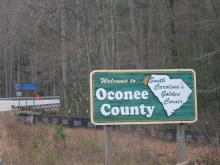Two South Carolina Cooperatives Bring Broadband to Blue Ridge
Two utility cooperatives in South Carolina – one electric, the other a telephone co-op – have teamed up and are now cooperating to bring fiber-to-the-home Internet service to members living in Anderson, Greenville, Oconee, Pickens and Spartanburg counties.
In September 2020, the Blue Ridge Electric Cooperative (BREC) announced the partnership with WCFIBER, a subsidiary of the West Carolina Telephone Cooperative (WCTEL). WCFIBER has a well-established reputation as a rural broadband provider – serving Abbeville, McCormick, and Greenwood counties, as well as parts of Columbia County, GA – while BREC has a long and proud history delivering electricity to residents and businesses who call this part rural/part suburban corner of South Carolina home.
It’s a partnership that has given birth to Upcountry Fiber, a new subsidiary owned by Blue Ridge Electric Cooperative. The plan is to build out the network incrementally with construction expected to take five years to complete. BREC is not only focused on serving its 25,000 members, when the network is fully built-out, all 64,890 households and businesses in Blue Ridge’s 1,800 square mile service area will have access to gigabit speed fiber connectivity.



